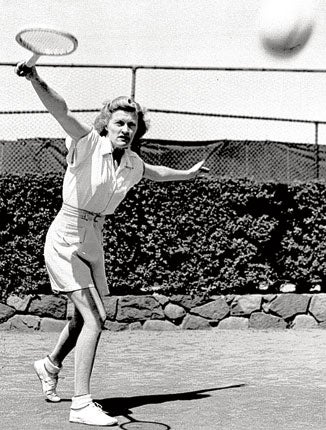Pauline Betz: Grand slam-winning tennis player banned for merely considering turning professional

Your support helps us to tell the story
From reproductive rights to climate change to Big Tech, The Independent is on the ground when the story is developing. Whether it's investigating the financials of Elon Musk's pro-Trump PAC or producing our latest documentary, 'The A Word', which shines a light on the American women fighting for reproductive rights, we know how important it is to parse out the facts from the messaging.
At such a critical moment in US history, we need reporters on the ground. Your donation allows us to keep sending journalists to speak to both sides of the story.
The Independent is trusted by Americans across the entire political spectrum. And unlike many other quality news outlets, we choose not to lock Americans out of our reporting and analysis with paywalls. We believe quality journalism should be available to everyone, paid for by those who can afford it.
Your support makes all the difference.Pauline Betz dominated women's tennis during the 1940s, winning five grand slam singles titles and one mixed doubles title. Blessed with powerful ground strokes, a rasping backhand, speed, unbounding stamina, athleticism and a killer instinct, Betz looked set to dominate for years to come in the same way that Martina Navratilova was to later. However, her amateur career was cut short in April 1947 when the US Lawn Tennis Association banned her from amateur matches – and therefore all grand slams, as professionals were only admitted in 1968.
Betz's crime was that along with Sarah Palfrey Cooke, another multiple Grand Slam winner, she considered the suggestion made by Cooke's husband that she turn professional, though no contract was signed. As the great Jack Kramer wrote in his 1979 memoir, "She was ruled out as an amateur on the basis of intent." He believed she was the second-best woman player he had seen, behind Helen Wills Moody.
Born in Dayton, Ohio in 1919, Pauline May Betz was raised in Los Angeles and was introduced to tennis at the age of nine by her mother, a PE teacher. She was soon winning tournaments throughout California, attaining her first national top-10 ranking at 19. She won a scholarship to Rollins College in Florida, where she graduated in economics in 1943. She played for the men's team at No 4, alongside Kramer.
Betz was still an undergraduate in 1942 when she won her first US singles title. Although shorter than most on the circuit, her steel and determination was exemplified in her semi-final against Margaret Osborne duPont, saving a match point at 5-3 down in the final set. The final saw her beat Louise Brough 4–6, 6–1, 6–4. The two met again the next year, with Betz again victorious in another gruelling three-set final.
Between 1941 and 1946, Betz fought her way to a record six consecutive US singles finals, winning on four occasions. In September 1946, the week she won her fourth US Open, she appeared on the cover of Time, which proclaimed her "the first lady of tennis."
In 1946, she won the women's Wimbledon singles title at the first time of asking without dropping a set, beating Louise Brough in the final 6-2, 6-4, and also played a key role in America's victorious Wightman Cup team. At the time of her suspension, in 1947, Betz was world No 1, undefeated in 39 matches, and the reigning Wimbledon and US Open champion. She immediately turned professional, enjoying a 13-year undefeated career on tour with such notables as Pancho Segura, Don Budge, Kramer and "Gorgeous Gussie" Moran.
In retirement Betz coached professionally, while motherhood did not diminish her on-court tenacity: in a 1959 exhibition, while five months pregnant, she beat Althea Gibson, the first black woman to win a Grand Slam title. Betz played tennis until 2003 and was also an excellent golfer, table-tennis player and tournament bridge player.
Martin Childs
Pauline Betz, tennis player: born Dayton, Ohio 6 August 1919; married 1949 Bob Addie (died 1982; five children); died Potomac, Maryland 31 May 2011.
Join our commenting forum
Join thought-provoking conversations, follow other Independent readers and see their replies
Comments